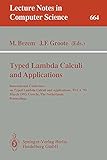Typed Lambda Calculi and Applications [electronic resource] : International Conference on Typed Lambda Calculi and Applications TLCA '93 March, 16–18, 1993, Utrech, The Netherlands Proceedings / edited by Marc Bezem, Jan Friso Groote.
Material type: TextSeries: Lecture Notes in Computer Science ; 664Publisher: Berlin, Heidelberg : Springer Berlin Heidelberg, 1993Description: IX, 443 p. online resourceContent type: text Media type: computer Carrier type: online resourceISBN: 9783540475866Subject(s): Computer science | Logic design | Logic, Symbolic and mathematical | Computer Science | Mathematical Logic and Formal Languages | Logics and Meanings of Programs | Programming Techniques | Mathematical Logic and FoundationsAdditional physical formats: Printed edition:: No titleDDC classification: 005.131 LOC classification: QA8.9-QA10.3Online resources: Click here to access online
TextSeries: Lecture Notes in Computer Science ; 664Publisher: Berlin, Heidelberg : Springer Berlin Heidelberg, 1993Description: IX, 443 p. online resourceContent type: text Media type: computer Carrier type: online resourceISBN: 9783540475866Subject(s): Computer science | Logic design | Logic, Symbolic and mathematical | Computer Science | Mathematical Logic and Formal Languages | Logics and Meanings of Programs | Programming Techniques | Mathematical Logic and FoundationsAdditional physical formats: Printed edition:: No titleDDC classification: 005.131 LOC classification: QA8.9-QA10.3Online resources: Click here to access online  E-BOOKS
E-BOOKS
| Current library | Home library | Call number | Materials specified | URL | Status | Date due | Barcode |
|---|---|---|---|---|---|---|---|
| IMSc Library | IMSc Library | Link to resource | Available | EBK6119 |
On Mints' reduction for ccc-calculus -- A formalization of the strong normalization proof for System F in LEGO -- Partial intersection type assignment in applicative term rewriting systems -- Extracting constructive content from classical logic via control-like reductions -- Combining first and higher order rewrite systems with type assignment systems -- A term calculus for Intuitionistic Linear Logic -- Program extraction from normalization proofs -- A semantics for ? &-early: a calculus with overloading and early binding -- An abstract notion of application -- The undecidability of typability in the Lambda-Pi-calculus -- Recursive types are not conservative over F? -- The conservation theorem revisited -- Modified realizability toposes and strong normalization proofs -- Semantics of lambda-I and of other substructure lambda calculi -- Translating dependent type theory into higher order logic -- Studying the fully abstract model of PCF within its continuous function model -- A new characterization of lambda definability -- Combining recursive and dynamic types -- Lambda calculus characterizations of poly-time -- Pure type systems formalized -- Orthogonal higher-order rewrite systems are confluent -- Monotonic versus antimonotonic exponentiation -- Inductive definitions in the system Coq rules and properties -- Intersection types and bounded polymorphism -- A logic for parametric polymorphism -- Call-by-value and nondeterminism -- Lower and upper bounds for reductions of types in ? and ?P (extended abstract) -- ?-Calculi with conditional rules -- Type reconstruction in F? is undecidable.
The lambda calculus was developed in the 1930s by Alonzo Church. The calculus turned out to be an interesting model of computation and became theprototype for untyped functional programming languages. Operational and denotational semantics for the calculus served as examples for otherprogramming languages. In typed lambda calculi, lambda terms are classified according to their applicative behavior. In the 1960s it was discovered that the types of typed lambda calculi are in fact appearances of logical propositions. Thus there are two possible views of typed lambda calculi: - as models of computation, where terms are viewed as programs in a typed programming language; - as logical theories, where the types are viewed as propositions and the terms as proofs. The practical spin-off from these studies are: - functional programming languages which are mathematically more succinct than imperative programs; - systems for automated proof checking based on lambda caluli. This volume is the proceedings of TLCA '93, the first international conference on Typed Lambda Calculi and Applications,organized by the Department of Philosophy of Utrecht University. It includes29 papers selected from 51 submissions.


There are no comments on this title.